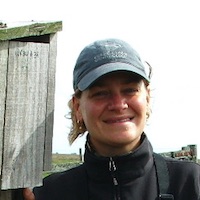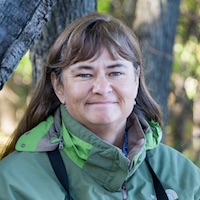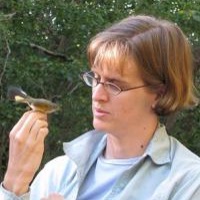The NAOC2020 Steering Committee provides overall direction and supervision of all other committees for the conference. The Steering Committee includes representatives of all Partner Societies joining the conference formally, plus several members-at-large with experience and liaisons in Puerto Rico. The Committee coordinates planning with the AOS Meeting Coordination Committee (co-chaired by Mike Webster and Colleen Handel), which provides additional institutional knowledge and best practices from previous NAOC events. The Steering Committee’s two co-chairs, Thomas Sherry (Member-At-Large, American Ornithological Society) and Jim Chace (First Vice-President, Wilson Ornithological Society), share all responsibility for the conference, a task necessitated by its size and complexity.
The mission of the Committee is to provide organization and structure for the conference, to raise funds and make all financial and logistic decisions, to plan and execute regular conference calls of the Steering Committee, to foster transparent communication and cooperation, and to provide encouragement when necessary. The Steering Committee also works closely with the Local Committee (Puerto Rico), e.g. on local arrangements, theme, and logo, and in providing thematic direction for the conference.
Thomas W. Sherry (Tom) | Co-chair

Professor, Tulane University (U.S.A.)
Member-At-Large/American Ornithological Society
Tom teaches Ecology, Conservation Biology, and Climate Change and has supervised 16 PhD students. His research includes factors controlling long-distance migratory bird populations, especially wintering in the Caribbean (1986-present); global change impacts on birds; and evolution of specialization/coexistence mechanisms in tropical birds. He received the George H. Lowery Award from the Louisiana Ornithological Society in 2016 and has been published in Proceedings Royal Society B, Proceedings National Academy of Sciences, and Science, as well as authoring “Foods and Foraging” in Cornell Lab of Ornithology Handbook of Bird Biology, 3rd edition. He also co-chaired the New Orleans NAOC in 2002.
Jameson F. Chace | Co-chair

Professor, Salve Regina University (U.S.A.)
Wilson Ornithological Society
Jim is Professor of Biology with joint appointment in departments of Cultural, Environmental and Global Studies and Biology and Biomedical Sciences at Salve Regina University in Newport, Rhode Island. He earned his PhD at the University of Colorado-Boulder studying cowbird-host interactions in human modified landscapes. He currently studies abundance and distribution of wintering sea duck populations, stopover habitat use in an urban riparian conservation easement, breeding ecology of the Canada Warbler, and cowbird-host interactions.
Colleen Barber

Professor, Saint Mary’s University (Canada)
Society of Canadian Ornithologists/Société des Ornithologistes du Canada (SCO-SOC)
Colleen received her PhD from Queen’s University, Canada, back when multi-locus DNA fingerprinting was done with P-32. She is now a full professor in the Department of Biology at Saint Mary’s University (Halifax, Nova Scotia, Canada), as well as the Associate Dean of Graduate Studies and Research. With her students, she undertakes research on mate choice and parental investment in passerines.
Leonardo Chapa-Vargas

Professor, Institute for Scientific and Technological Research of San Luis Potosi (Mexico)
CIPAMEX
Dr. Leonardo Chapa-Vargas received a B.Sc. degree in Biology at the Universidad Nacional Autónoma de México (UNAM) and a M.Sc. and Ph.D. in Natural Resources and Environmental Sciences at the University of Illinois at Urbana-Champaign, studying the effects of habitat fragmentation across scales on nesting success of Acadian Flycatchers. Since 2004, Dr. Chapa-Vargas has served as a professor of Environmental Sciences at the Institute for Scientific and Technological Research of San Luis Potosi, Mexico, and is the current President of the Society for Bird Study and Conservation (CIPAMEX). He has been the main advisor of 11 M.Sc. and six Ph.D. students and has published nearly 40 papers in indexed journals. Dr. Chapa’s research focuses on the effects of land use change, mine-generated pollution, and exposure to agrochemicals on various avian responses including community structure and composition, population demography, individual health status, and avian-parasite interactions.
Valentina Ferretti (Vale)

Research Scientist, Instituto de Ecología, Genética y Evolución de Buenos Aires of the Consejo Nacional de Investigaciones Científicas y Tecnológicas (Argentina)
Association of Field Ornithologists
Vale is an avian evolutionary ecologist broadly interested in the diversification of avian life-histories, including spatial and temporal patterns of variation in mating systems and breeding parameters. The questions she asks explore the interface between ecology, behavior, morphology and evolution of mating systems and breeding biology. She uses molecular tools combined with field observations and manipulative experiments to investigate the effects of ecological variables on reproductive traits within and across species. She completed her undergraduate studies at Universidad de Buenos Aires, Argentina, and her MSc and PhD at Cornell University, US. She was a postdoc at the University of North Carolina at Wilmington for one year and at Villanova University for two years, following her PhD. She has been an elected Council Member for the Association of Field Ornithologists (AFO) for two terms and is now an elected Vice-president. She is also an Elective Member of the American Ornithological Society (AOS).
Colleen M. Handel

Research Wildlife Biologist, U.S. Geological Survey (U.S.A.)
American Ornithological Society
Colleen is an ecologist interested in the factors that govern population dynamics in birds. She leads the Alaska Science Center’s Landbird Research Program in a broad array of projects, ranging from the effects of climate change on distribution and population dynamics in the boreal-Arctic transition zone to the etiology and effects of an epizootic of beak deformities. Her research also includes the breeding and migration ecology of arctic and subarctic shorebirds. She earned a B.A. from Harvard University and M.S. and Ph.D. from the University of California Davis. She was co-founder of Boreal Partners in Flight and the Alaska Shorebird Group. She is an elected Fellow and past Councilor of the American Ornithological Society (AOS) and serves as Deputy Editor for The Condor: Ornithological Applications. Most recently she served as Local Chair of the 2019 AOS conference. She is also a long-standing member of many other ornithological and scientific societies.
Nicola Koper

Professor, Natural Resources Institute, University of Manitoba (Canada)
Society of Canadian Ornithologists/Société des Ornithologistes du Canada (SCO-SOC)
Nicola is a conservation biologist who studies anthropogenic impacts on temperate grassland birds and tropical birds. Her foci include the impacts of oil and gas development, particularly regarding anthropogenic noise, on grassland birds, and the impacts of agricultural activities on tropical species. She applies landscape ecology and behavioral ecology to understand these effects. She also works extensively on developing and improving research methods and analytical approaches. Prof. Koper is an Associate Editor for The Condor: Ornithological Applications and Wildlife Society Bulletin and is Section Co-Editor (Natural Resources) for Current Landscape Ecology Reports. She works closely with Canadian and international NGOs and governments to help apply current scientific knowledge to solving habitat and bird conservation and management issues.
Sara R. Morris

Professor, Canisius College (U.S.A.)
Member-At-Large/Wilson Ornithological Society
Sara is a Professor of Biology and the interim Vice President for Academic Affairs at Canisius College in Buffalo, NY. She has served the ornithological community in a variety of roles, including as Secretary of the Wilson Ornithological Society and American Ornithologists’ Union, President of the Wilson Ornithological Society, elected Council Member of the American Ornithological Society, Scientific Committee member for NAOC V and VI, and Steering Committee member for NAOC VI and VII. Since 1990, she has led the Appledore Island Migration Station in its study of passerine migration and stopover ecology in the Gulf of Maine. She also studies migration and flight calling behavior at the Braddock Bay Bird Observatory in New York. She has published in The Auk, The Condor, The Wilson Journal of Ornithology, The Journal of Field Ornithology, The Journal of Avian Biology, Animal Behaviour, Hormones and Behavior, and Frontiers in Zoology.
Melinda Pruett-Jones

Executive Director, American Ornithological Society (U.S.A.)
Melinda applies her decades of executive experience leading mission-based organizations committed to conservation action, science education, and research excellence through substantial growth and strategic change to advance AOS’s bold vision for ornithology. She works to foster an organizational culture that drives excellence and innovation, engages and diversifies constituent groups and audiences, cultivates and guides cooperative partnerships, and secures funding to sustain the Society. Prior to joining AOS, her roles included Executive Director of Chicago Wilderness, VP for Applied Research at Chicago Zoological Society/ Brookfield Zoo, Director of Major Gifts at The Field Museum, and Academic Coordinator for University of California’s Natural Reserve System. Melinda serves on a number of regional and national committees and boards. While her current area of inquiry involves organizational life cycles and network governance, her research background is in the social behavior, ecology, and population biology of birds.
Jennifer Smith (Jen) | Chair, Diversity & Inclusion Committee

Assistant Professor, Department of Environmental Science and Ecology, University of Texas at San Antonio (U.S.A.)
Association of Field Ornithologists
Jen is an applied avian ecologist, and her research aims to evaluate the effects of global change on the spatial ecology, demography, and behavior of birds and, on occasion, other taxa. Her research often takes a mechanistic approach by incorporating field observations, experiments, and statistical and geospatial analyses. Much of her work addresses the effects of land-use and management decisions in rural landscapes but has recently expanded to consider urbanization. Overall, her objective is to conduct research that informs policy and promotes sustainable land uses that consider the conservation of wildlife and human well-being. She completed her undergraduate at Cardiff University and her PhD at the University of Birmingham (both in the UK). Jen is an elected Council Member for the Association of Field Ornithologists (AFO) and Associate Editor for The Condor.
Lisa Sorenson

Adjunct Associate Professor, Boston University
Bird Caribbean
Lisa is an ornithologist and conservation ecologist with 30+ years of experience working in the Caribbean, including teaching, research, environmental impact assessment work, project planning, and conservation education and training. She has expertise in waterbird and wetland ecology and conservation, climate change impacts on waterfowl and wetlands, outreach and communication strategies, and monitoring techniques. As Executive Director of the non-profit BirdsCaribbean, Lisa leads the organization’s region-wide projects and programs that raise awareness, promote sound science, and empower local partners to build a region where people appreciate, conserve, and benefit from thriving bird populations and ecosystems.
Judith Toms

Biologist, Canadian Wildlife Service (Canada)
Member-At-Large/Society of Canadian Ornithologists/Société des Ornithologistes du Canada (SCO-SOC)
Judith is a wildlife biologist with the Canadian Wildlife Service, Environment and Climate Change Canada, and an Adjunct Professor at the University of Alberta. Her research interests are broadly focused in avian ecology, conservation ecology, and applied statistics. In her day job, Judith works to advance our understanding of boreal bird populations, particularly the cumulative impacts of multiple anthropogenic stressors. She has also been working in Puerto Rico since 2006, studying long-term avian population dynamics of migratory and resident species in a tropical dry forest.
Mike Webster

Professor, Cornell University (U.S.A.)
American Ornithological Society
Mike is the Robert G. Engel Professor of Ornithology at Cornell University and Director of the Macaulay Library at the Cornell Lab of Ornithology. His research focuses on the evolutionary causes and consequences of communication signals, such as plumage color and song, in Australian fairywrens and North American wood warblers. Mike also active in the American Ornithological Society (AOS) and is currently chair of the AOS Meetings Coordination Committee.
